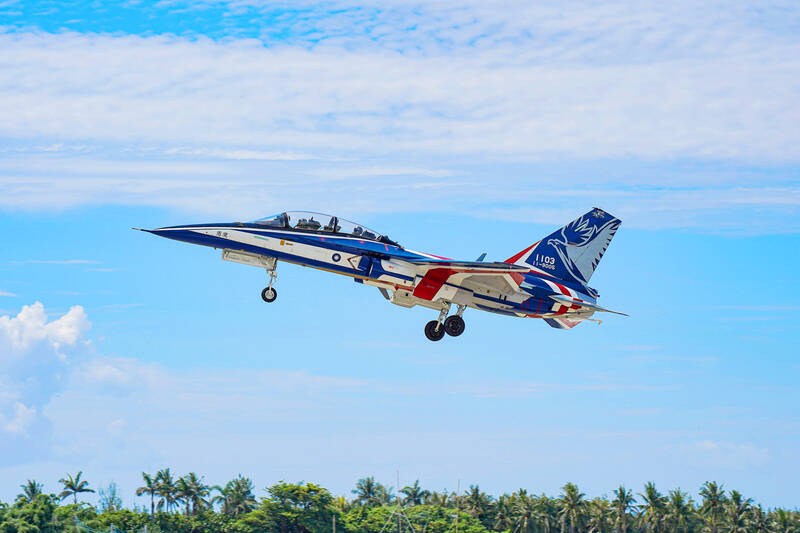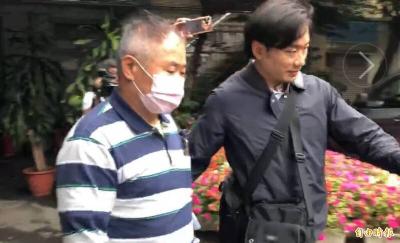The air force should look to domestic manufacturers to replace its fleet of Beechcraft T-34C trainer aircraft, Aerospace Industrial Development Corp (AIDC) general manager Ma Wan-chun (馬萬鈞) said.
The Taiwanese defense aviation sector is entirely dependent on air force contracts and therefore needs the political leadership to be clear about its vision for the naiton, Ma told the Liberty Times (the Taipei Times’ sister newspaper) in an interview published on Thursday.
The air force is interested in obtaining new propeller planes to replace its Beechcraft T-34Cs, which are nearing the end of their service life, as well as domestically made aircraft power plants and fifth-generation fighter jets, Ma said.

Photo: Aaron Tu, Taipei Times
The T-34Cs are turbo-prop aircraft used by the air force to train rookie pilots, while the AIDC T-5 Brave Eagle jets are used for advanced pilot training.
Implementation of plans to acquire those items would have a decisive impact on Taipei’s policy to transform the nation’s aerospace and defense industry into a global powerhouse, he said.
AIDC is particularly interested in the potential contract to replace the trainer aircraft, as a cost-benefit analysis suggests that a lease with a foreign airplane manufacturer would not benefit Taiwan, he said.
The party that provides the replacement aircraft would demand prices to meet its bottom line and Taiwan is not likely to get a licensed production deal that would allow aircraft to be made for export, Ma said.
Even if a lease were to include licensed production, the nation’s involvement would be limited to meeting domestic demand or doing grunt work that does not bolster Taiwan’s technological potential, he said.
Moreover, obtaining jets domestically would enable the Taiwanese aerospace sector to gain experience in designing and manufacturing advanced aircraft, he said.
AIDC learned lessons in aircraft design from developing the F-CK-1 jets for the Indigenous Defense Fighter program, he said, adding that the nation had to rely on imports for aircraft systems.
The Advanced Jet Trainer Program not only led to the creation of AIDC T-5 jets, but also the beginnings of an indigenous industrial capability to make aircraft systems, he said.
AIDC has 200 downstream partners in the production of aircraft systems, including antennas, lights and other equipment for the T-5 jets, Ma added.
While only 55 percent of the parts used in T-5s were sourced in Taiwan, AIDC believes it can source 75 percent of a turbo-prop design indigenously, he said.
Giving AIDC the contract for a turbo-prop trainer aircraft would allow Taiwan to increase its military self-sufficiency, he said.
Furthermore, the nation would need to boost its ability to produce aircraft systems if the nation is to pursue the development of an indigenous fifth-generation fighter for the Advanced Defense Fighter program, Ma said.
The most crucial part of a fifth-generation fighter is the aircraft systems and not the airframe itself, he said, adding that the nation possesses the technological potential, but not yet the experience to produce such aircraft.
Additional reporting by Liou Yu-chieh and Wu Che-hu

Taiwan would benefit from more integrated military strategies and deployments if the US and its allies treat the East China Sea, the Taiwan Strait and the South China Sea as a “single theater of operations,” a Taiwanese military expert said yesterday. Shen Ming-shih (沈明室), a researcher at the Institute for National Defense and Security Research, said he made the assessment after two Japanese military experts warned of emerging threats from China based on a drill conducted this month by the Chinese People’s Liberation Army’s (PLA) Eastern Theater Command. Japan Institute for National Fundamentals researcher Maki Nakagawa said the drill differed from the

A fugitive in a suspected cosmetic surgery fraud case today returned to Taiwan from Canada, after being wanted for six years. Internet celebrity Su Chen-tuan (蘇陳端), known as Lady Nai Nai (貴婦奈奈), and her former boyfriend, plastic surgeon Paul Huang (黃博健), allegedly defrauded clients and friends of about NT$1 billion (US$30.66 million). Su was put on a wanted list in 2019 when she lived in Toronto, Canada, after failing to respond to subpoenas and arrest warrants from the Taipei District Prosecutors’ Office. Su arrived at Taiwan Taoyuan International Airport at 5am today on an EVA Air flight accompanied by a

A 79-year-old woman died today after being struck by a train at a level crossing in Taoyuan, police said. The woman, identified by her surname Wang (王), crossed the tracks even though the barriers were down in Jhongli District’s (中壢) Neili (內壢) area, the Taoyuan Branch of the Railway Police Bureau said. Surveillance footage showed that the railway barriers were lowered when Wang entered the crossing, but why she ventured onto the track remains under investigation, the police said. Police said they received a report of an incident at 6:41am involving local train No. 2133 that was heading from Keelung to Chiayi City. Investigators

The Keelung District Prosecutors’ Office today requested that a court detain three individuals, including Keelung Department of Civil Affairs Director Chang Yuan-hsiang (張淵翔), in connection with an investigation into forged signatures used in recall campaigns. Chang is suspected of accessing a household registration system to assist with recall campaigns targeting Democratic Progressive Party (DPP) city councilors Cheng Wen-ting (鄭文婷) and Jiho Chang (張之豪), prosecutors said. Prosecutors yesterday directed investigators to search six locations, including the Chinese Nationalist Party’s (KMT) Keelung office and the residences of several recall campaign leaders. The recall campaign leaders, including Chi Wen-chuan (紀文荃), Yu Cheng-i (游正義) and Hsu Shao-yeh